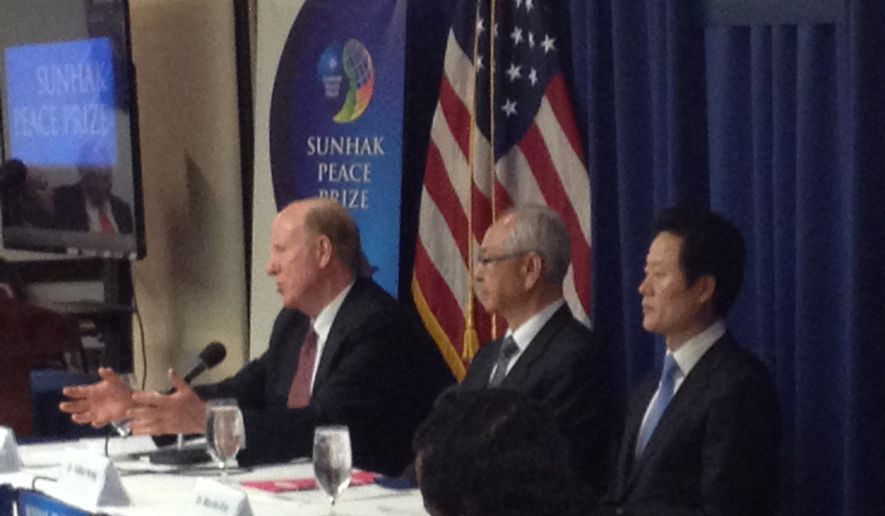The president of an Pacific island nation under siege by the sea and an Indian fisheries scientist whose work is helping to feed the world’s poor are the first winners of the $1 million Sunhak Peace Prize awarded Monday in Washington.
Kiribati President Anote Tong and Indian researcher Modadugu Vijay Gupta were chosen from 182 candidates from 66 countries for the prize.
Mr. Tong is fighting to manage the fate of his nation of 103,000 people who live on many islands in the South Pacific. Half of the citizens live on Tarawa Atoll, which has an average elevation of less than 7 feet above sea level and is being slowly lost to the sea.
Mr. Gupta was honored for creating an aquaculture system tailored to poor, rural populations in Asia, Africa and the Pacific. His methods have allowed communities to feed themselves and empower women by teaching them how to raise and harvest the fish.
The Sunhak Peace Prize is intended to recognize and empower innovations in human development, conflict resolution and ecological conservation, said organizers, who held a press conference to announce the inaugural winners Monday at the National Press Club.
The prize was proposed by Dr. Hak Ja Han Moon several months after the passing of her husband, Rev. Dr. Sun Myung Moon, the founder of the Unification Church who died in September 2012 at age 92. The name of the prize is derived from both their names.
The prizes will not be awarded based on celebrity or popularity, but on “substantial contributions” made by individuals or organizations to the ideal of peace, said Thomas G. Walsh, chairman of the Sunhak Peace Prize Foundation.
Mr. Tong has designated a sizable portion of the nation’s nearby ocean waters as a “marine protected area,” as well as started preparations for a “mass migration with dignity” plan, in which the Kiribati citizens will be evacuated to other islands, including Fiji.
Each winner will receive $500,000 at an Aug. 28 ceremony in Seoul, as well as an opportunity to describe their activities to an audience of 1,000 dignitaries from around the world.
“The Sunhak Peace Prize was established on the belief that it is this generation’s responsibility to create a peaceful civilization for future generations,” Il-Sik Hong, former president of Korea University and chairman of the Sunhak Peace Prize Committee, told Monday’s press conference.
Other committee members include Boutros-Boutros Ghali, former secretary general of the United Nations; Jose de Venecia, Jr., former speaker of the Philippines House of Representatives; Erna Hennicot-Schoepges, former president of Luxembourg’s Parliament; Ohno Yoshinori, former Japanese defense minister; Sun-Jo Hwang, president of Sunmoon University; Venerable Seong-Ta, former chief monk of Bulguksa Temple; and Larry Beasley, president of The Washington Times.
This year’s prize focused on the theme of ocean conservation, climate change and aquaculture, said Mr. Walsh, who is also president of the Universal Peace Federation International. Future prizes will consider such fields as poverty relief, disease eradication, conflict resolution, religious harmony, unification of North and South Korea, threats to biodiversity and energy depletion.
According to the organizers, candidate criteria include having “contributed significantly” to the promotion of “the tenets of peace” of the Sunhak Peace Prize. Individual candidates must still be living, and achievements of both individuals and organizations must have had a positive impact on the realization of peace among diverse nations, races, religions or ideologies.
The Moons founded The Washington Times in 1982.
• Cheryl Wetzstein can be reached at cwetzstein@washingtontimes.com.




Please read our comment policy before commenting.